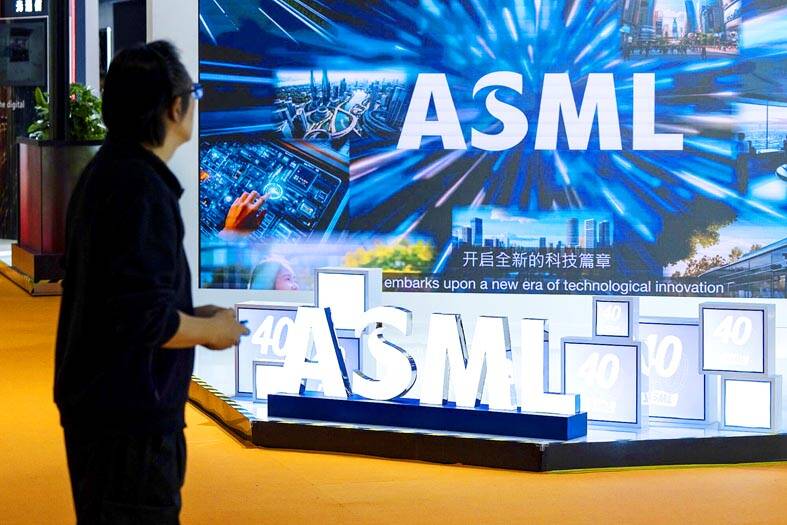ASML Holding NV, a Dutch manufacturer of advanced chipmaking machines that are critical to global supply chains, yesterday reaffirmed its long-term revenue outlook as it bets on an artificial intelligence (AI)-driven boom in semiconductor demand.
The Dutch firm projected that sales in 2030 would range from 44 billion euros to 60 billion euros (US$46 billion to US$63 billion), in line with its previous forecast, according to a statement issued as part of the company’s investor day.
The outlook is meant to reassure investors after the company’s order intake significantly missed analysts’ estimates in the third quarter, sparking a selloff in its shares and those of other chip-related businesses. Chipmakers such as Nvidia Corp have enjoyed a boom in demand for their AI chips. However, sales to other key buyers, including automakers, and mobile phone and PC manufacturers, have remained mired in a prolonged slump.

Photo: Bloomberg
ASML expects growing AI demand would help boost global chip sales to over US$1 trillion by 2030, which it said represents an annual growth rate in the semiconductor market of about 9 percent.
ASML is the only company in the world that makes the kind of lithography machines that help semiconductor companies in turn produce the advanced chips powering everything from Apple Inc’s smartphones to Nvidia’s AI accelerators.
Manufacturing more cutting-edge AI chips would mean more of ASML’s advanced extreme ultraviolet (EUV) lithography machines would be needed by semiconductor makers. The company foresees double-digit growth in EUV spending annually through 2030 for both advanced logic and DRAM.
The company forecast a gross margin of between approximately 56 percent and 60 percent in 2030.
While ASML last month cut its sales outlook for next year, it said yesterday it would maintain its spending priorities.
However, weighing on ASML’s prospects is the US government’s ongoing effort to limit China’s rise in the semiconductor sector, through repeated rounds of export controls that have targeted the sale of advanced AI chips and chipmaking equipment. The Dutch government has struggled to find a middle ground between its US ally and ASML’s biggest market.
Due to US pressure, ASML has never been able to sell its EUV machines to China and was restricted from shipping its second most-advanced tools from this year.
China accounted for 2.79 billion euros of sales in the third quarter, nearly half of ASML’s total. The company expects China sales to account for about 20 percent of total revenue next year.
US pressure on ASML to further restrict sales of semiconductor technology to Beijing would likely grow, ASML chief executive officer Christophe Fouquet said in an interview with Bloomberg last month.
Fouquet, who took the helm at ASML in April, told investors last month that he expects a slow chip market recovery to extend “well into 2025.”
Still, next year and 2026 would be growth years for the industry and ASML overall, he said.

In Italy’s storied gold-making hubs, jewelers are reworking their designs to trim gold content as they race to blunt the effect of record prices and appeal to shoppers watching their budgets. Gold prices hit a record high on Thursday, surging near US$5,600 an ounce, more than double a year ago as geopolitical concerns and jitters over trade pushed investors toward the safe-haven asset. The rally is putting undue pressure on small artisans as they face mounting demands from customers, including international brands, to produce cheaper items, from signature pieces to wedding rings, according to interviews with four independent jewelers in Italy’s main

Japanese Prime Minister Sanae Takaichi has talked up the benefits of a weaker yen in a campaign speech, adopting a tone at odds with her finance ministry, which has refused to rule out any options to counter excessive foreign exchange volatility. Takaichi later softened her stance, saying she did not have a preference for the yen’s direction. “People say the weak yen is bad right now, but for export industries, it’s a major opportunity,” Takaichi said on Saturday at a rally for Liberal Democratic Party candidate Daishiro Yamagiwa in Kanagawa Prefecture ahead of a snap election on Sunday. “Whether it’s selling food or

CONCERNS: Tech companies investing in AI businesses that purchase their products have raised questions among investors that they are artificially propping up demand Nvidia Corp chief executive officer Jensen Huang (黃仁勳) on Saturday said that the company would be participating in OpenAI’s latest funding round, describing it as potentially “the largest investment we’ve ever made.” “We will invest a great deal of money,” Huang told reporters while visiting Taipei. “I believe in OpenAI. The work that they do is incredible. They’re one of the most consequential companies of our time.” Huang did not say exactly how much Nvidia might contribute, but described the investment as “huge.” “Let Sam announce how much he’s going to raise — it’s for him to decide,” Huang said, referring to OpenAI

The global server market is expected to grow 12.8 percent annually this year, with artificial intelligence (AI) servers projected to account for 16.5 percent, driven by continued investment in AI infrastructure by major cloud service providers (CSPs), market researcher TrendForce Corp (集邦科技) said yesterday. Global AI server shipments this year are expected to increase 28 percent year-on-year to more than 2.7 million units, driven by sustained demand from CSPs and government sovereign cloud projects, TrendForce analyst Frank Kung (龔明德) told the Taipei Times. Demand for GPU-based AI servers, including Nvidia Corp’s GB and Vera Rubin rack systems, is expected to remain high,